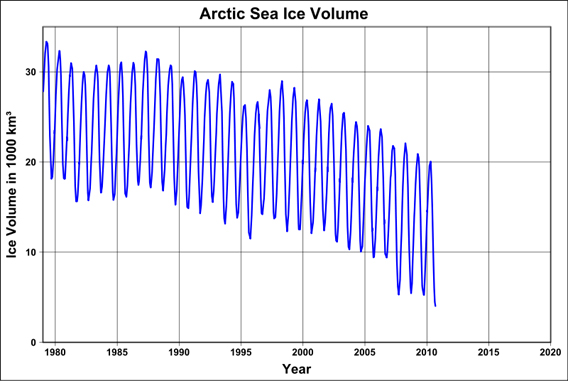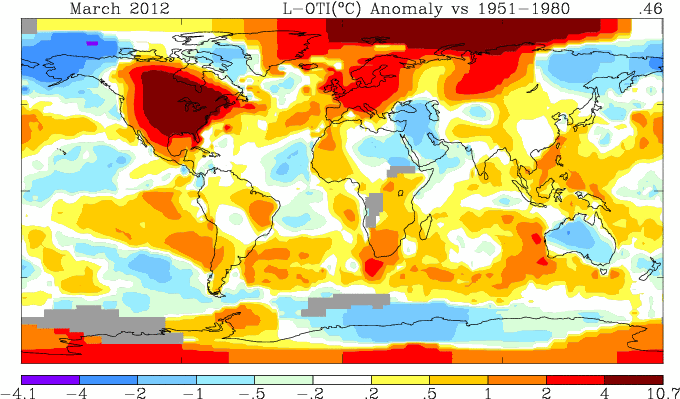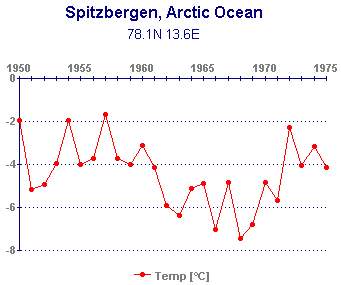Environment & Energy
Related: About this forum2011 Avg. Arctic Temps 4.1F Above 1951-80 Historic Average; Sea Ice Volume Lowest On Record

Last year the Arctic, which is warming faster than anywhere else on Earth due to global climate change, experienced its warmest twelve months yet. According to recent data by NASA, average Arctic temperatures in 2011 were 2.28 degrees Celsius (4.1 degrees Fahrenheit) above those recorded from 1951-1980. As the Arctic warms, imperiling its biodiversity and indigenous people, researchers are increasingly concerned that the region will hit climatic tipping points that could severely impact the rest of the world. A recent commentary in Nature Climate Change highlighted a number of tipping points that keep scientists awake at night.
"If set in motion, [tipping points] can generate profound climate change which places the Arctic not at the periphery but at the core of the Earth system," Professor Duarte, a climatologist with the University of Western Australia's Ocean Institute and co-author other paper, said in a press release. "There is evidence that these forces are starting to be set in motion. This has major consequences for the future of human kind as climate change progresses."
One of the tipping points is sea ice loss. The Arctic wasn't just relatively hot last year—beating the previous record set in 2010 by 0.17 degrees Celsius (0.3 degrees Fahrenheit)—it also experienced the lowest sea ice volume yet recorded, and the second-lowest extent. Sea ice is essential to many Arctic species, from polar bears to walrus, and narwhals to seals. In just over 30 years, sea ice volume has dropped precipitously, declining by 76 percent from 1979 (16,855 cubic kilometers) to 2011 (4,017 cubic kilometers). This loss of sea ice also leads to greater regional and global warming, as the Arctic's sea reflects the sun's light back into space, cooling not only the region but the world.
EDIT
Governments have responded to warming in the Arctic with a resource race. Governments with Arctic territories plan to drastically expand oil and gas exploitation, utilize new shipping routes, and increase mining. The industrialization of the Arctic, according to Duarte, may only accelerate impacts on the fragile region and push tipping points.
EDIT
Read more: http://news.mongabay.com/2012/0213-hance_arctic_tippingpoints.html?utm_source=dlvr.it&utm_medium=twitter#ixzz1mTZHXBfx
Nihil
(13,508 posts)... to the point where the maximum volume in Winter will be less than
the minimum volume in Summer a couple of decades ago ...
![]()
guardian
(2,282 posts)Wow. It was warmer than temps from 1951-1980. I just so happens that that period was especially cold. This is about as significant as saying this afternoon is warmer than last night. FAIL
http://www.gfdl.noaa.gov/bibliography/related_files/higgins0201.pdf
During the 1950s, temperatures were cooler than normal in the northwest and warmer than normal in the southeast. This pattern was dominated by the strong La Nin˜a episode during the mid-1950s. From the 1950s to the 1960s, temperatures decreased over much of the United States, except in the West. During the 1970s, winter temperatures remained cooler than normal over much of the United States ... during the 1970s (not shown) indicated that very cold weather during the late 1970s, especially over the northern United States, dominated relatively warm weather that occurred during the early 1970s (in association with the 1972/73 El Nino).
XemaSab
(60,212 posts)Dead_Parrot
(14,478 posts)
NickB79
(19,233 posts)Comprehension fail.
truebrit71
(20,805 posts)Epic Fail.
hatrack
(59,584 posts)FAIL yourself.
guardian
(2,282 posts)But none of the doomers will acknowledge that either because it doesn't fit your earth is doomed fantasy.
http://www.arctic.noaa.gov/essay_walsh.html
"... including a cooling of the Arctic from the 1940s to the 1960s. "

http://icecap.us/images/uploads/Scientists_Counter_Latest_Arctic.pdf
"...a negative gradient (cooling — many Fairbanksans
remember the very cold winters in the 1960s) from 1940 to 1975"
http://carc.org/pubs/v15no5/2.htm
"... Over the period of instrumental or historic record, the northern hemisphere has experienced three distinct phases: a general warming trend from the 1880s until the 1940s, a period of cooling until the mid 1960s, .... The Canadian Arctic has reflected a similar pattern"
There are other references if you want to find them.